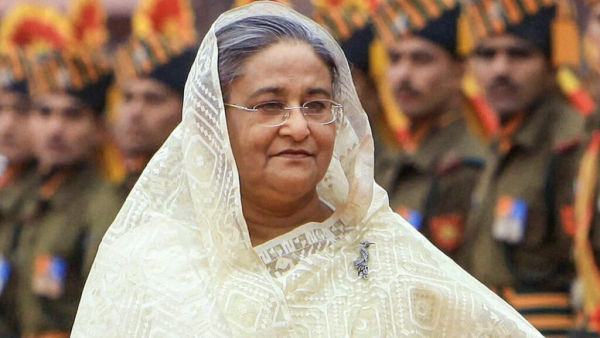
The knives are out, and this time the Awami League and the interim government of Bangladesh, led by Professor Muhammad Yunus, are locked in a bitter war of words over the damning verdict by a Bangladesh tribunal that has handed down a death sentence to Sheikh Hasina, the former prime minister of Bangladesh. The International Crimes Tribunal of Bangladesh has found her guilty of crimes against humanity during student protests in the country in July last year.
The verdict has come over a year after she was ousted as prime minister and took refuge in India. The tribunal says she knew about the killings and issued orders, but Hasina refutes the charges, saying the tribunal itself is rigged and presided over by an unelected regime.
In an exclusive article to THE WEEK, Hasina shared her concerns about the impending verdict of the International Crimes Tribunal of Bangladesh.
ALSO READ: Sheikh Hasina’s World Exclusive to THE WEEK: ‘I have faced down unelected politicians before’
“The international community must recognise this tribunal for what it is,” she said. “It is a tool to criminalise political opposition and rewrite lawful governance as criminality. The charges were brought with no formal notice of proceedings by a compromised prosecution that has freely engaged in a trial by media,” she explained.
The Hasina–Yunus face-off is critical on two counts. First, the Yunus administration can now put pressure on New Delhi to stop giving refuge to Hasina, who has been termed a “fugitive” by the tribunal. If more political parties join the chorus, New Delhi may be in a tough spot explaining its reasons for doing so, as the strain in the relationship may begin to show.
There has been thinking within some political forces, like the Bangladeshi Jamaat-e-Islami, that the Yunus government should have waited for the ICT trial to complete before putting an interim ban on the Awami League. Whether the chorus for preventing the Awami League and its leaders from contesting the elections, expected to be held in February next year, will increase remains to be seen. If yes, then is it sunset for the Awami League for the next five years at least?
Prof. Yunus, for now, seems on track to take his country towards elections next year. This throws up yet another question. Cries for Hasina’s death sentence are bound to drive emotional reactions in the coming days and months. Can the Awami League use this opportunity to get a new lease of life in its political journey? Already, the Awami League is using this as an opportunity to drive home the point that elections be held soon.
But the ICT verdict has given enough room to the Yunus government to keep the Awami League at bay. Mohammad Tajul Islam, Chief Prosecutor, International Crimes Tribunal, Bangladesh, has argued that it wasn’t just the massacre of hundreds of civilians during three harrowing weeks last July and August last year. Rather, Hasina’s regime had become a machinery of repression over more than a decade as it allegedly sat over enforced disappearances, custodial killings, and arbitrary detentions. “A trial of Hasina before the ICT would thus not be an act of vengeance against a fallen autocrat, but a necessary step toward justice and accountability,” he told THE WEEK.
But the Bangladesh Awami League is in no mood to step back now, In a detailed statement, it has taken on the Yunus government, saying, “In their distasteful call for the death penalty, they reveal the brazen and murderous intent of extremist figures within the interim government to remove Bangladesh’s last elected prime minister, and to nullify the Awami League as a political force.”
Hasina said she wishes to remind the international community that not a single citizen of Bangladesh has cast a vote for Prof. Yunus or been given the chance to do so. “Bangladesh’s future belongs to its people, and the election next year must be free, fair and inclusive,” she declared.
Interestingly, the poll bugle in Bangladesh has been sounded, and ironically it is the Awami League in exile that has decided to take the plunge with it. If the elections are held without the Awami League’s participation, Hasina would not return to her country for some years at least. But if the Awami League fights the polls and loses to another party, will the elected regime uphold the death sentence handed down by the ICT? These may be extreme propositions, but they are real worries not just for the Awami League but also for the interim government to think about as it rolls out its next steps towards fulfilling its vision and promises for the people of Bangladesh.